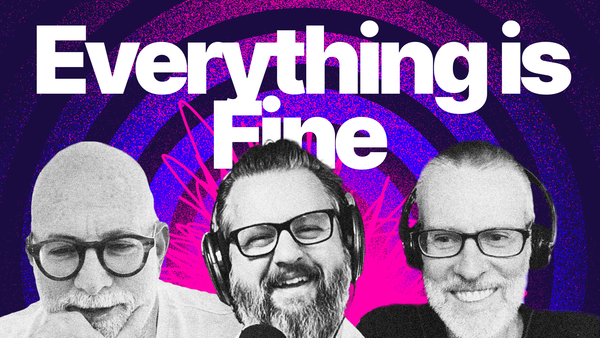Saving the open web
A new economic bargain is coming into focus

Charlie Kirk was a master of the Information Space. He idolized Rush Limbaugh, but he took a different path, choosing to use media as leverage for political influence. The media ecosystem is far more decentralized now than when Limbaugh was the face of conservative talk radio in the 1990s. Kirk didn’t have to choose a lane of political organizing or media. He could straddle both, using his political action committee, Turning Point USA, to exert power within conservative Republican circles while marrying it with a high-octane modern media operation of podcasts, social media clips and college campus tours. He even sold Kirk’s Hot Sauce for $8.99 a bottle.
Kirk was a master of the Information Space by embracing the lust for combat and spectacle. He as a natural at the cut-and-thrust of Jubilee-style debates. He would set up a table with a “debate me” sign. This created the element of spectacle, critical in the Information Space, reliably creating clips of Kirk rhetorically demolishing progressive students who do not understand how skilled people like Kirk are at rhetoric. I’m not going to romanticize these types of debates as successors to ancient Athenians hashing out civic life in the Agora, but Kirk was an energetic participant in the democratic process, and political violence is so dangerous because it is designed to penalize that.
Today, I wrote about the viability of the open web. First, a highlight from our latest research report about how publishers are taking total monetization approaches.
Who owns subscriptions?

Publishers now rely on a wider mix of revenue streams than ever before, from ads and events to subscriptions, commerce, and licensing. But the CRO role hasn’t kept pace. On paper, titles are consolidating around “chief revenue officer.” In practice, authority is fragmented. One CRO told us they’re accountable for the entire topline yet spend most of their time on ads and events, while other growth areas sit with different executives. Even where leadership looks unified, decision-making is still dispersed. The result: structural gaps that complicate planning and slow the ability to act in real time.
Thanks to Piano for its support in creating this research report. Piano’s Digital Revenue Optimization solution helps digital services grow revenue by better understanding and influencing their customers’ behavior. Piano unifies analytics, segmentation, and commercial personalization in one AI-driven application, enabling sites and apps to efficiently maximize the value of every user visit. For more information, visit piano.io.
Saving the open web
The viability of the open web is an open question as never before.
Google has stated as much in a court filing in its ad-tech antitrust case: “The fact is that today, the open web is already in rapid decline.”Google claims this is completely consistent with the soothing words from its head of search about the vibrancy of the open web. You see, it’s just open web advertising, which is the economic engine of the open web, that is in rapid decline. Six of one, half dozen of another.
I rarely find a publisher that is betting on the ad-supported open web as a growth engine. In fact, it’s quite the opposite. They want to talk about how they’re talent management companies, events companies, integrated marketing solutions providers, and so on. Many publishers followed the incentives of the market to grab as much referral traffic as possible, mainly through Google, and monetize it via programmatic advertising, again mainly through Google’s pipes.
Without the traffic, there is no programmatic attention extraction. Google has rapidly decreased the amount of traffic it sends to most publishers through search. Many news publishers are hooked on Google Discover, which creates its own bad incentives to flood the zone with regurgitation.
Forbes CEO Sherry Phillips put its traffic declines at 30%-40%. In my conversations with publishers and marketplace participants, this checks out as the case nearly across the board. Yes, there are exceptions like Essentially Sports and Newsweek, but broadly the story is the same. In The Rebooting’s recent research report, just 23% of publishers said they had seen no impact on their traffic from AI Overviews.
The introduction of AI Overviews has accelerated the shift to zero-click searches. When it inevitably becomes the default search experience, this will accelerate the deterioration of the open web even more quickly.
Cloudflare CEO Matthew Prince has warned that AI represents an existential threat to publishers. The fact that an infrastructure provider like Cloudflare sees this threat is telling. According to Tollbit, human visitors to websites declined nearly 10% from Q1 to Q2. In the first quarter, 1 in 200 visitors was AI; in the second quarter, it was 1 in 50.
Companies like Cloudflare and Tollbit are jockeying to come up with the foundations of a new economic model. Joining them is a new initiative to create a new open licensing standard, built on the RSS and called RSL (Really Simple Licensing). This initiative, supported by a raft of big open web publishers, would expand on the robots.txt protocol to include detailed instructions of what’s OK to crawl and what’s not, and critically what kind of licensing and royalty terms apply.
The focus on the browser is a sign that the open web still has tremendous value. The Browser Company barely got any adoption, yet Atlassian paid $610 million for its AI-enabled browser, Dia. Perplexity’s browser, Comet, plans to compensate publishers, if with a tiny $42.5 million fund.
These all point to the need for a new economic bargain as the nature of the web changes, and terms like browsing, pages and clicks become obsolete. The old bargain of allowing crawling in exchange for traffic is obsolete. Companies are ignoring robots.txt and crawling anyway. Cloudflare’s shift to default block bots has led to lots of workarounds. RSL’s parent organization, the RSL Collective, includes Fastly, like Cloudflare a content delivery network.
All of these initiatives hinge on whether those currently using the content for free will pay, or if they’ll find a way around these efforts and claim fair use. The political pressure on them will be minimal. Trump’s top AI advisor, David Sacks, has said training is fair use, and it’s hard to believe Trump is going to side with publishers over tech companies.
The recent case against Anthropic is instructive. It was found to be blameless for buying and scanning books for training, yet it got dinged for using piracy libraries. Anthropic settled to the tune of $1.5 billion for using the piracy libraries. A new investigation by The Atlantic found that AI companies have slurped millions of YouTube videos for training. (The weird tone of AI chatbots could be explained by The Atlantic finding 50,000 TED videos were in the data sets.)
AI companies are spending tons of money on compute, and they clearly aren’t ready to add a new line item for licensing content. However, there is building sentiment that a new bargain is needed, and Prince claims the biggest AI companies recognize this. The details matter in constructing some kind of system that is able to somewhat fairly reward content creators, or the open web will turn into a frustrating series of cul-de-sacs.
This week on People vs Algorithms, we’ll discuss the decline and fall of the open web. You can get PvA on various podcasting platforms, including on YouTube if that’s your thing. Other items on our agenda:
- In praise of aggregators. The demise of social media has made the case for old-school aggregators. Techmeme is somehow now 20 years old and still valuable. I am partial to the simplicity of Media Star for media business news. So far, I haven’t seen AI do this kind of curation nearly as well.
- The uncanny valley of product unveils. Apple showcased some new phones yesterday. Many were underwhelmed. These gadget reveals feel as tired as late-night TV yuck-yuck interviews. It’s not like Apple teased a humanoid robot; it’s just incremental advances. It’s not a coincidence that Apple is in its extraction phase, with high-margin services revenue advancing on its hardware revenue as a profit contributor.
- Rupert Murdoch’s improbable winning streak. He settled his lawsuit with three of his children – billionaires are not like normal people, don’t ever try to convince me otherwise – and will safeguard the conservative bent to his media properties. He’s also navigated Trump 2.0 far better than most titans. He’s not groveled and instead stung Trump regularly through The Wall Street Journal, whose editorial page has been vocal critics of Trump’s tariff policy. The emergence of the Epstein’s birthday book page with the page with Trump’s signature exactly as The Journal reported is a giant W in the defamation case Trump brought against the Journal and Murdoch personally.
Plus: Derek Thompson’s great conversation with neurologist and author Suzanne O’Sullivan about her book Age of Diagnosis; a reality check on the supposed print resurgence; and the decentralization of social networks.
Thanks for reading. Send me your thoughts by hitting reply.
For sponsorship information, see our partnerships page.

